
Control Theory and Technology
Scope & Guideline
Transforming Knowledge into Control Innovations
Introduction
Aims and Scopes
- Control System Design and Analysis:
The journal emphasizes the development and analysis of control systems, including robust control, adaptive control, and optimal control strategies. Research in this area aims to enhance system performance and reliability across different applications. - Data-Driven Control Approaches:
There is a significant focus on data-driven methodologies, such as system identification and model predictive control, which utilize data to inform control strategies and improve system responses in real-time. - Application of AI and Machine Learning:
The integration of artificial intelligence and machine learning techniques in control systems is a prominent theme, exploring how these technologies can optimize and enhance control strategies. - Multi-Agent Systems and Cooperative Control:
The journal publishes research on multi-agent systems, emphasizing decentralized and cooperative control approaches that allow multiple agents to work together effectively in complex environments. - Cyber-Physical Systems and Security:
With the rise of interconnected systems, the journal addresses control strategies for cyber-physical systems, including security measures against cyber-attacks and resilience in control methodologies. - Emerging Technologies and Applications:
Research addressing innovative applications of control theory in emerging fields such as robotics, autonomous systems, and smart grids is a key focus area, showcasing the versatility of control technologies.
Trending and Emerging
- Robust and Fault-Tolerant Control:
Recent publications show a growing interest in robust and fault-tolerant control methods, particularly for systems operating in uncertain environments or facing potential failures, highlighting the importance of reliability in control applications. - Advanced Machine Learning Applications:
There is an increasing incorporation of advanced machine learning techniques in control strategies, showcasing the potential for these methodologies to enhance system performance and adaptability. - Cybersecurity in Control Systems:
As cyber-physical systems become more prevalent, research focusing on cybersecurity measures in control systems is gaining traction, emphasizing the need for secure and resilient control architectures. - Multi-Agent Cooperation and Consensus Control:
Emerging research on multi-agent systems, particularly in consensus and cooperative control, reflects a trend towards decentralized approaches that leverage the capabilities of multiple agents to solve complex tasks. - Real-Time Optimization and Adaptive Control:
The trend towards real-time optimization approaches, particularly in adaptive control systems, is on the rise, indicating a shift towards more responsive and flexible control solutions that can adjust to changing conditions.
Declining or Waning
- Traditional PID Control Techniques:
There has been a noticeable reduction in publications focusing solely on traditional PID control techniques, as researchers increasingly explore more advanced control strategies that address complex system behaviors. - Linear Control Strategies:
While linear control strategies remain foundational, there appears to be a decline in research specifically dedicated to linear control methods, with a growing preference for nonlinear and adaptive approaches. - Static System Modeling:
The emphasis on static system modeling is diminishing as dynamic and time-varying systems gain more attention, reflecting the need for more sophisticated modeling techniques that can capture real-world complexities. - Single-Agent Control Systems:
Research centered around single-agent control systems is becoming less prominent, as the focus shifts towards collaborative and multi-agent frameworks that can address more complex control challenges. - Theoretical Control Concepts without Practical Application:
There is a decline in purely theoretical discussions that do not lead to practical applications, as the journal increasingly favors research that demonstrates real-world applicability and impact.
Similar Journals
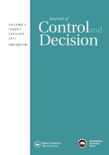
Journal of Control and Decision
Advancing Interdisciplinary Insights in Control SystemsJournal of Control and Decision, published by Taylor & Francis Ltd, is a premier academic journal that serves as a vital resource in the interdisciplinary fields of control systems, artificial intelligence, optimization, and human-computer interaction. Established in 2014 and converging into its upcoming decade, the journal emphasizes rigorous research and practical applications, contributing significantly to both academic discourse and technological advancements. With an impressive categorization in various quartiles, notably Q2 in Control and Systems Engineering and Q3 in several other categories, the journal showcases high-quality contributions that enhance our understanding of complex decision-making processes. Although it currently does not offer open access options, the journal is committed to maintaining impactful scholarly communication, securing its position in Scopus rankings across multiple disciplines. Researchers, practitioners, and students are encouraged to engage with its rich content to foster innovation and knowledge sharing in these dynamic fields.
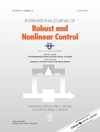
INTERNATIONAL JOURNAL OF ROBUST AND NONLINEAR CONTROL
Innovating Interdisciplinary Approaches to Control SystemsINTERNATIONAL JOURNAL OF ROBUST AND NONLINEAR CONTROL, published by Wiley, is a leading journal in the fields of Aerospace Engineering, Biomedical Engineering, Chemical Engineering, Control and Systems Engineering, Electrical and Electronic Engineering, Industrial and Manufacturing Engineering, and Mechanical Engineering. With an impressive range of categories all ranked in the Q1 quartile as of 2023, this journal serves as a pivotal platform for disseminating high-quality research focused on robust and nonlinear control methodologies. Researchers and practitioners benefit from its comprehensive scope, which includes theoretical advances, algorithm development, and practical applications. The journal's commitment to fostering innovation in control systems is reflected in its notable Scopus rankings across various engineering disciplines, ensuring your work reaches a wide audience. Emphasizing the importance of collaboration in interdisciplinary contexts, the INTERNATIONAL JOURNAL OF ROBUST AND NONLINEAR CONTROL is essential for both seasoned researchers and newcomers in the engineering community, providing a vital resource for advancing the frontiers of knowledge in control systems.
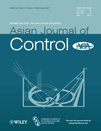
ASIAN JOURNAL OF CONTROL
Shaping the Future of Control Engineering ResearchWelcome to the Asian Journal of Control, an esteemed publication in the fields of Control and Systems Engineering as well as Electrical and Electronic Engineering, published by WILEY. With a continuous convergence from 2000 to 2024, this journal serves as a vital platform for researchers, professionals, and students, offering high-quality peer-reviewed articles that drive innovation and advancement in various control strategies and systems. The journal is renowned for its rigorous academic standards, reflected in its impressive Scopus rankings, with a percentile of 90th in Mathematics (miscellaneous) and 67th in Engineering Control and Systems. Although it does not currently offer open access, the Asian Journal of Control remains an indispensable resource for those looking to push the boundaries of knowledge in engineering disciplines. With its Q2 category ranking in both relevant fields, the journal is poised to influence future research and applications, making it a must-read for those invested in the evolving landscape of control technologies.
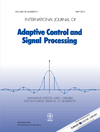
INTERNATIONAL JOURNAL OF ADAPTIVE CONTROL AND SIGNAL PROCESSING
Pioneering Research in Adaptive Control and Signal ProcessingINTERNATIONAL JOURNAL OF ADAPTIVE CONTROL AND SIGNAL PROCESSING, published by Wiley, is a premier peer-reviewed journal dedicated to the advancing field of adaptive control and signal processing. With a consistent publication history since 1987, this journal serves as a critical platform for disseminating innovative research and developments that contribute to both theoretical and practical aspects of engineering disciplines, specifically within the realms of control systems, electrical engineering, and signal processing. Boasting a commendable impact with quartile rankings in Q2 for Control and Systems Engineering, Electrical and Electronic Engineering, and Signal Processing, it ranks #93 among 321 journals in Control and Systems Engineering with a 71st percentile in Scopus rankings, underscoring its significance in fostering academic excellence. Although it does not offer open access, the journal is accessible through institutional subscriptions and individual purchases, promoting an extensive reach to researchers, professionals, and students eager to stay at the forefront of adaptive technologies. Whether seeking to explore cutting-edge methodologies or to gain insights into real-world applications, readers will find this journal to be an invaluable resource in the dynamic landscape of engineering innovation.

Control Engineering and Applied Informatics
Transforming Ideas into Practical Innovations in Control EngineeringControl Engineering and Applied Informatics, published by the Romanian Society for Control Technology and Informatics, serves as a pivotal platform for disseminating research and advancements within the fields of control engineering and applied informatics. With an ISSN of 1454-8658, this journal focuses on integrating theoretical developments and practical applications in the context of both electrical engineering and computer science. Although it currently holds a Q4 ranking in both Computer Science (miscellaneous) and Electrical and Electronic Engineering categories, its commitment to fostering interdisciplinary collaboration and innovation makes it a noteworthy publication for researchers and professionals aiming to explore emerging trends and solutions in control systems. Situated in Romania, the journal has a converged publication timeline from 2010 to 2024, providing a rich archive of information for those invested in the scientific community. Readers are encouraged to access this journal to remain at the forefront of cutting-edge research and contribute to ongoing discussions in the field.
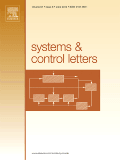
SYSTEMS & CONTROL LETTERS
Exploring the Nexus of Technology and Engineering SolutionsSYSTEMS & CONTROL LETTERS is a prestigious journal published by ELSEVIER, dedicated to the advancement of knowledge in the fields of Systems and Control Engineering. With an ISSN of 0167-6911 and E-ISSN 1872-7956, this journal has become a cornerstone for academics and professionals alike, featured in the top quartile (Q1) categories for Computer Science (miscellaneous), Control and Systems Engineering, Electrical and Electronic Engineering, and Mechanical Engineering as of 2023. The journal encompasses a broad scope of interdisciplinary research and technological advancements, providing a forum for innovative ideas that can shape modern engineering practices. Despite being a subscription-based journal, its impact is underscored by significant Scopus rankings, with a notable placement in the 70th percentile for General Computer Science and consistent recognition across multiple engineering disciplines. With origins dating back to 1981 and converging through to 2024, SYSTEMS & CONTROL LETTERS continues to serve as an essential resource for researchers seeking to publish high-quality research, thereby fostering collaboration and knowledge dissemination within the engineering community.
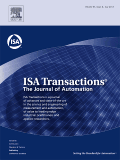
ISA TRANSACTIONS
Fostering Collaboration in Cutting-edge ResearchISA TRANSACTIONS, published by Elsevier Science Inc, is a premier academic journal that serves as a vital platform for advancing knowledge in the fields of Applied Mathematics, Computer Science Applications, Control and Systems Engineering, Electrical and Electronic Engineering, and Instrumentation. With an impressive H-index reflecting its scholarly impact, the journal is recognized in the top quartile (Q1) across its categories as of 2023, showcasing its significance within these disciplines. The journal boasts a robust Scopus ranking, placing it amongst the top journals globally—ranked #16 in Applied Mathematics and #6 in Instrumentation—highlighting its influence and reputation. ISA TRANSACTIONS not only contributes to theoretical advances but also addresses practical applications in engineering and technology, making it essential reading for researchers, professionals, and students seeking to stay at the forefront of innovation. Published continuously since 1968, it promises to remain a cornerstone for future research until at least 2024, fostering academic discourse and collaboration in a rapidly evolving technical landscape.
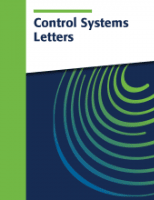
IEEE Control Systems Letters
Connecting Theory with Practical Applications.IEEE Control Systems Letters is a prestigious journal dedicated to the field of control systems engineering, published by the IEEE - Institute of Electrical and Electronics Engineers. Established in 2017, this journal has rapidly gained recognition, achieving a notable impact factor and consistently ranking in the Q1 category for both Control and Optimization and Control Systems Engineering as of 2023. It provides a platform for researchers and professionals to share cutting-edge research, methodologies, and applications in control theory and system dynamics. With a robust Scopus ranking, placing it in the 76th percentile for Control and Optimization and the 64th percentile for Engineering, this journal is essential for those seeking to advance their knowledge and stay current with innovative developments in control systems. The journal's commitment to high-quality, peer-reviewed articles makes it an invaluable resource for academics, practitioners, and students alike who are passionate about engineering and applied mathematics.
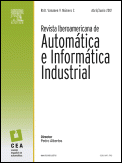
Revista Iberoamericana de Automatica e Informatica Industrial
Connecting Ideas in Automation and Industrial InformaticsRevista Iberoamericana de Automatica e Informatica Industrial (ISSN: 1697-7912, E-ISSN: 1697-7920) is a distinguished open-access journal published by UNIV POLITECNICA VALENCIA, EDITORIAL UPV, since its inception in 2007. Based in Valencia, Spain, the journal aims to foster the dissemination of high-quality research in the fields of automation and industrial informatics. With a commendable impact reflected in its 2023 Scopus rankings—Q2 in Computer Science (miscellaneous) and Q3 in Control and Systems Engineering—it serves as a pivotal platform for innovative contributions from both established researchers and emerging scholars. The journal is committed to accessibility, ensuring that all articles are freely available to a global audience, promoting collaborative advancement in technology and engineering. Its coverage spans from 2007 to 2024, making it a valuable resource for those engaged in cutting-edge research and applications in the interdisciplinary landscape of computer science and engineering.
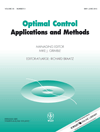
OPTIMAL CONTROL APPLICATIONS & METHODS
Connecting experts to drive automation and optimization forward.OPTIMAL CONTROL APPLICATIONS & METHODS, published by WILEY, is a prestigious academic journal dedicated to advancing the field of applied mathematics, control, and optimization. With an impressive impact factor in its respective categories—ranking in the second quartile for Applied Mathematics, Control and Optimization, and Control and Systems Engineering—the journal serves as a vital platform for disseminating innovative research findings and methodologies from 1980 to 2024. The journal is indexed in Scopus, with notable rankings in its discipline, highlighting its significance in the scientific community; specifically, it is ranked 143rd in Applied Mathematics and 35th in Control and Optimization, underscoring the quality and relevance of the research it publishes. Although not an open-access journal, it provides essential insights and methodologies of paramount importance to researchers, professionals, and students committed to the fields of control theory and systems engineering. It continues to foster knowledge and collaboration among experts to address complex challenges in automation and optimization.